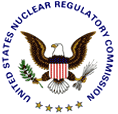| Search Options | ||||
| Index | Site Map | FAQ | Facility Info | Reading Rm | New | Help | Glossary | Contact Us | ||||

| Home > Electronic
Reading Room > Document
Collections > News
Releases > 2005 > 05-038 |
|||||||||
 |
|
||||||||
| No. 05-038 | March 1, 2005 | ||||||||
RENEWS LICENSE FOR
DRY-CASK SPENT FUEL INSTALLATION AT |
|||||||||
|
The Nuclear Regulatory Commission has renewed the license of Dominion Generation for its dry-cask independent spent fuel storage installation at the Surry nuclear power plant in Surry, Va., for an additional 40 years. "The license includes strict conditions to monitor potential effects of aging on the integrity of the casks," said E. William Brach, director of the NRC’s Spent Fuel Project Office. "These conditions include additional inspections to be conducted by the licensee and continuous monitoring of radiation at the boundary of the dry-cask storage facility." This is the first time the NRC has renewed a license for a dry-cask spent nuclear fuel storage facility. In December, the agency renewed the license for an away-from-reactor spent fuel pool storage facility at G.E. Morris in Illinois. The 40-year term for Surry’s renewed license represents an exemption from NRC regulations that specify a 20-year license term for spent fuel storage facilities. The Commission approved the exemption in early December. At that time, the agency emphasized its position that dry casks are an interim or temporary storage method for spent nuclear fuel until a permanent repository for high-level nuclear waste is available. Surry in 1986 became the first commercial nuclear plant to be licensed by the NRC to operate a dry-cask independent spent fuel storage installation. There are now more than 30 such installations in the United States. Typically, spent fuel is moved into NRC-approved dry casks after cooling at least five years in pools of water. Surry’s spent fuel pools are at capacity, making continued use of dry-cask storage important for the plant’s two reactors to continue to operate to the end of their current operating licenses in 2032 and 2033. |
|||||||||
|
Privacy Policy |
Site Disclaimer |